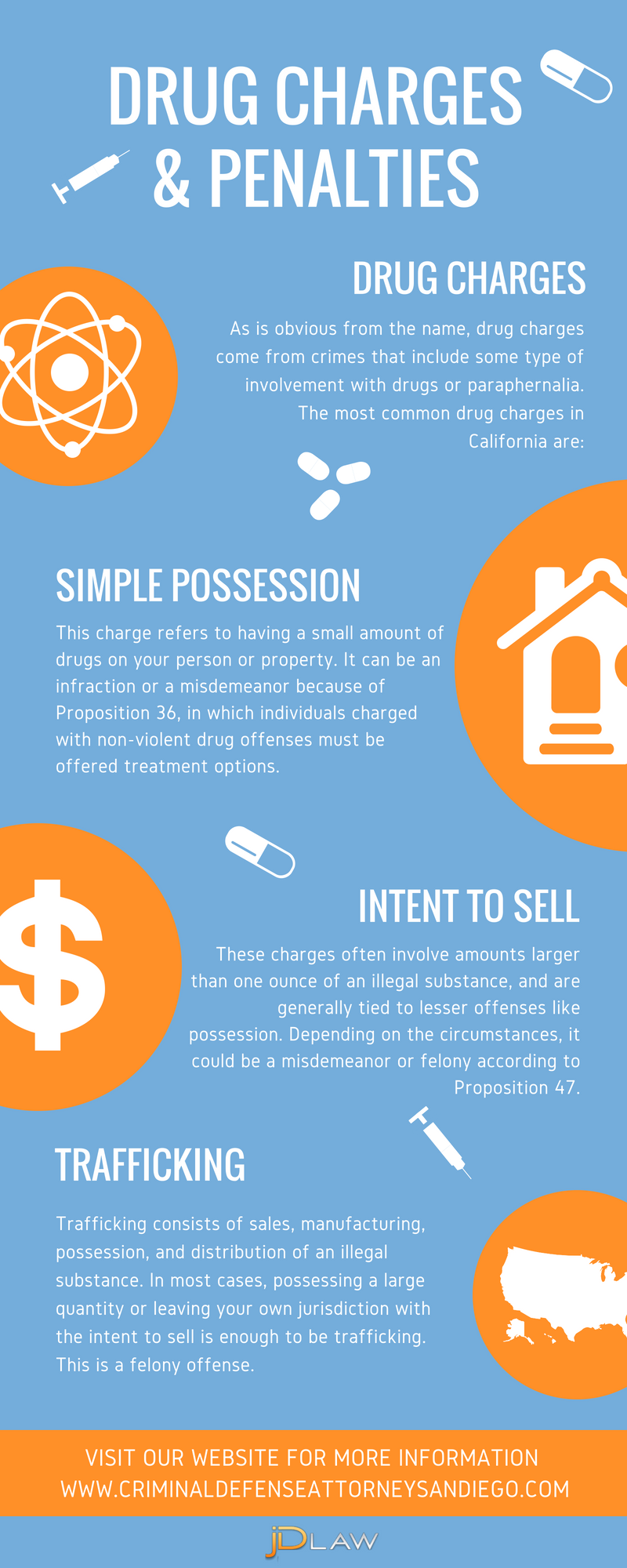A Guide to Drug Penalties in California


It seems that drug laws in California are changing all the time these days.
With recent laws, such as Proposition 47 passed in November 2014, the penalties for many drug crimes have been reduced or altered. Of course, any drug crime will have different penalties for different individuals depending on how many prior offenses they have, and the circumstances of the crime.
Some types of drugs are considered worse than others, and even minor offenses like possessing paraphernalia have their own penalties. It is easy to see how one could become confused about California’s drug laws and drug penalties.
Possession of a Controlled Substance
Under California Health & Safety Code 11350, it is illegal to be in possession of controlled substances listed in Section 11054, including narcotics such as heroin, ecstasy, cocaine, crack, and ketamine. It is also illegal to be in possession of prescription drugs such as Vicodin or codeine if the drugs have not been prescribed lawfully by a physician, dentist, podiatrist, or veterinarian licensed to practice in California.
Since the passage of Proposition 36 in 2000, most charged with this crime are eligible for a diversion program. And with the passage of Proposition 47, these charges have been reduced from felonies to misdemeanors. In most cases, the maximum penalty is up to one year in county jail and/or a fine up to $1,000.
Possession for Sale of Controlled Substances
While it is against the law to possess controlled substances, it is a much more serious crime to possess them for sale or purchase them for purposes of sale. (California Health & Safety Code 11351.) In other words, having narcotics with the intention of selling them. Those charged with this crime will not be eligible for a diversion program under Proposition 36.
Law enforcement officials and prosecutors will determine if the drugs were in possession for sale by looking at many factors. People convicted of this felony offense may face up to four years in state prison. At JD Law, we see too many people charged with this crime when they only had possession of a substance for personal use.
Transportation of a Controlled Substance
It is against the law to sell, furnish, administer, or otherwise transport a controlled substance. (California Health & Safety Code 11352.) This is a felony offense that carries penalties from three to five years in a state prison.
While you may picture large drug operations when you first hear of this crime, it can be much simpler than that. Even someone who sells a friend a few leftover prescription pills can be charged with transportation and face serious consequences.
Possession of Drug Paraphernalia
Those found in possession of an opium pipe, device, or any other item used for injecting or smoking a controlled substance will be charged with a misdemeanor. Paraphernalia may include hypodermic needles, pipes, bongs, and cocaine spoons.
Those convicted may face up to six months in a county jail. However, they are often eligible for a diversion program under Proposition 36. There are also defenses available to defeat the charges, such as that the items were found during an unlawful search and seizure performed by police.
Penalties for Methamphetamine Crimes
Possessing methamphetamine was once considered a felony in California. But with the passage of Proposition 47, people found in possession of methamphetamine will now face misdemeanor charges. But, possessing methamphetamine with the intention to sell, transport, or give it away is still a serious felony offense. Those convicted may face years in state prison.
Penalties for Marijuana Crimes
Recreational marijuana has been legal in California since January 2018. But it is only legal for adults over the age of 21, and you can only possess up to one ounce of marijuana at a time. Growing, selling, or transporting marijuana is still a serious crime in California, and considered felony offenses. A person convicted of any of these charges could face several years in state prison.
The Best Way to Reduce Your Penalties? Speak to a Lawyer
Too often, we at JD Law see people accused of a crime simply because they were in the wrong place at the wrong time. And they rarely know enough about their rights at the time of arrest to protect themselves.
While the penalties for many drug crimes in California can be severe, a San Diego drug crime attorney knows how to fight for the accused. Attorney James N. Dicks of JD Law makes it his personal mission to get his clients’ sentences reduced, or their cases dismissed altogether. For a free consultation about your own situation, please call (760) 630-2000.
Share this knowledge by:
Embedding the infographic by copying and pasting the following code onto your website:
<div align=”center”><a href=”https://jdlaw.law/blog/wp-content/uploads/2018/06/Drug-Charges-And-Penalties.png” target=”_blank”><img src=”https://jdlaw.law/blog/wp-content/uploads/2018/06/Drug-Charges-And-Penalties.png” alt=”Drug Charges and Penalties” width=”612″ border=”0″ class=”imgcenter” /></a> <p align=”center”><a href=”https://jdlaw.law/blog/wp-content/uploads/2018/06/Drug-Charges-And-Penalties.png” target=”_blank”>See Larger Image</a></div>
Linking to this page on your own website:
<a href=”https://jdlaw.law/blog/guide-to-drug-penalties-california/”>JD Law: Guide to Drug Penalties California Infographic</a>
Don’t Waste Any Time!
Call us today for a FREE Consultation
(760) 630-2000


- Criminal Law Expert - Led by a Board Certified Criminal Law Specialist. Read More
- 100s of Cases Tried - Since 1990, James Dicks has represented hundreds of clients. Read Bio
- Client Approved - Read our online testimonials from satisfied jD LAW Clients. Yelp Reviews
- May 30, 2024
When Juveniles Are Accused of Violent Crimes - May 20, 2024
What Should You Do During a Traffic Stop? - May 10, 2024
The Legal Concept of ‘Intent’ in Theft Crime …
 RSS
RSS





